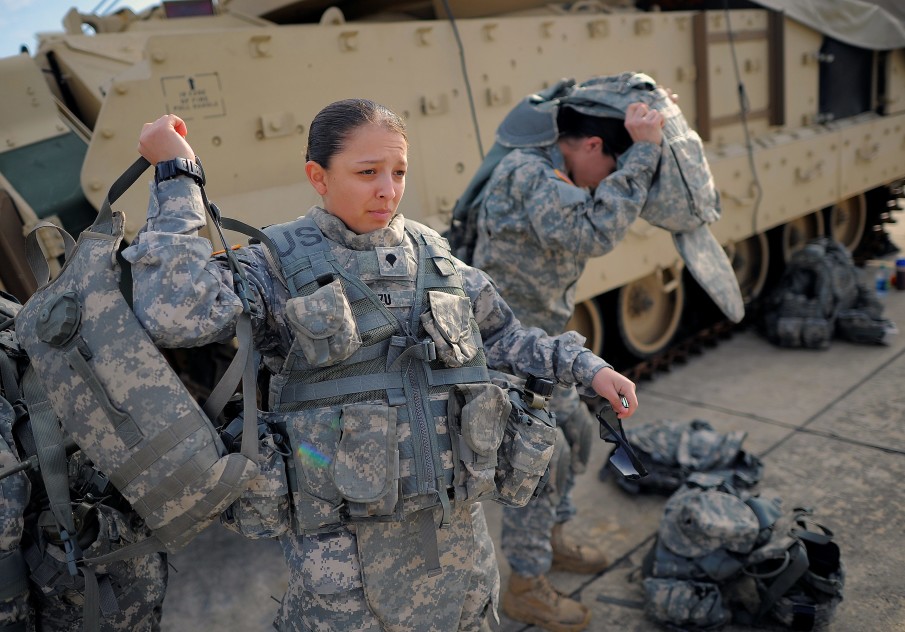Many articles have been written in recent years about women’s equality in the military, especially in regards to the opening of combat-arms positions to females. Plenty of ink (and pixels) have been spilled over this subject, and SOFREP is no exception. That said, one aspect of the opening of combat arms to women that has not been written about is the public-relations messaging the U.S. military is carrying out. Whether you agree or disagree with the prospect of female infantrymen, Green Berets, and SEALs, the positive PR campaign carried out by the Pentagon is impressive. For the first time, entire demographics that normally could not care less about the military are in full support of gender equality in the military.
One past example that always struck me was that of the Israeli Defense Forces (IDF). Israel supporters are quick to point out the IDF’s version of gender equality. These are usually photo galleries and even full-color hardcover photo books of young, and often quite pretty, women in the IDF. These materials do not necessarily focus on the combat prowess of the female IDF soldier, but rather on their sex appeal.
The false belief that IDF women are fully integrated into combat-arms positions is still very widespread in the Western world, despite that experiment failing in the 1980s. Today, Caracal, an Israeli border-patrol unit, is the only combat unit with gender integration. Most outsiders simply assume that these pretty, blue-eyed, blond-haired IDF women are down in the trenches like the men. The result is a terrific propaganda win for the IDF, one that stands in start contrast to Israel’s neighbors, which generally speaking, are not too cool about women’s rights.
Western audiences are flooded with imagery of the female ninja vixen, sexy and deadly at the same time. Hollywood examples abound, from Lara Croft to Ultraviolet to Black Widow. Today, it is almost obligatory to have a female archetype in action movies and novels. Friends and peers of mine have felt immense pressure to include fictional female ninja characters in their work, all in the name of reaching out to a larger demographic for commercial reasons. I would argue that the U.S. military is feeling the pressure to find some female action-adventure heroes for largely the same reasons: to drive recruitment, give the military a positive social image with young people, and help neutralize arguments put forward by anti-war leftists.
Opening combat arms to women gives the American public what they already believe to be true, based on their experiences in watching films ranging from “GI Jane” to “Zero Dark Thirty,” where strong female leads challenge male patriarchy (and institutional hierarchies) to prove that they can do anything a man can do. The fact is, I love the fiction as well. I’ve played almost every “Tomb Raider” video game, I thought “GI Jane” was a cool movie, and I like to see Milla Jovovich kicking some ass in “The Fifth Element” and the “Resident Evil” films.
Around .05 percent of Americans actually serve in the military today (contrasted with 12 percent during World War Two), which has led to a large ideological gap between the military and our civilian population. Opening combat arms to women makes the military at least appear more hip, more cool, and more egalitarian. The integration of women in combat arms is a complicated topic, one that has caused much consternation with veterans.
While I believe that if a woman meets all the same standards that my peers and I did, then she has just as much a right to wear a tan or green beret, much of the nuance of the actual integration is likely to be lost on the public, which is just happy to see women brought to the forefront in a new way. Remember, we’re a culture that goes crazy over “firsts”—be it the first Latino female in the Supreme Court or the first openly homosexual or bisexual politicians to hold public office.
The first female infantrymen, Ranger, Greet Beret, and SEAL will undoubtably churn up tons of positive press for the U.S. military. We’ve already seen it with the first two female graduates of Ranger School.
Whether you support women in combat roles or not, one thing you can be sure of is that war is an ugly thing. Soldiers die, or they come home missing limbs, suffering from PTSD and TBI. In combat, civilians often get caught in the crossfire, but none of this will be represented in the acclaim spread on the U.S. military as they open combat arms to women. This is what concerns me when it comes to the military’s PR campaign. The Pentagon is making war cool again, and they are using gender equality rhetoric which goes over well with Millennials to do it. Which is ironic, of course, because millennials want others to go and do the killing in their stead.
As youth culture evolves, the Pentagon has found the perfect meme to make the military, and ultimately war, hipster-friendly.
Already have an account? Sign In
Two ways to continue to read this article.
Subscribe
$1.99
every 4 weeks
- Unlimited access to all articles
- Support independent journalism
- Ad-free reading experience
Subscribe Now
Recurring Monthly. Cancel Anytime.











COMMENTS